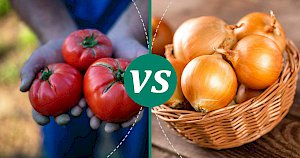Onion vs Tomato: Nutrition & Calories Compare


Onion vs Tomato
Nutrition Facts
Serving size:
change
5g10g15g20g30g40g50g60g80g100g120g140g160g180g200g220g250g300g350g400g450g500g600g700g800g900g1000g
1oz2oz3oz4oz5oz6oz7oz8oz10oz12oz15oz20oz25oz30oz35oz40oz50oz
Amount Per Serving:
Serving size:
change
5g10g15g20g30g40g50g60g80g100g120g140g160g180g200g220g250g300g350g400g450g500g600g700g800g900g1000g
1oz2oz3oz4oz5oz6oz7oz8oz10oz12oz15oz20oz25oz30oz35oz40oz50oz
Amount Per Serving:
Onion vs Tomato 100g Compare
| per 100g | Onion | Tomato |
|---|---|---|
| Calories | 40 | 18 |
| Carbohydrates | 9.34 g | 3.9 g |
| Fat | 0.1 g | 0.2 g |
| Dietary fiber | 1.7 g | 1.2 g |
| Protein | 1.1 g | 0.9 g |
| Calcium | 23 mg | 10 mg |
| Iron | 0.21 mg | 0.3 mg |
| Magnessium | 10 mg | 11 mg |
| Potassium | 146 mg | 237 mg |
| Sodium | 4 mg | 5 mg |
| Vitaminium A | 2 µg | 833 µg |
| Vitaminium B1 (Thiamine) | 0.046 mg | 0.037 mg |
| Vitaminium B3 (Niacin) | 0.116 mg | 0.594 mg |
| Vitaminium B6 | 0.12 mg | 0.08 mg |
| Vitaminium B9 (Folic acid) | 0.019 mg | 15 mg |
| Vitaminium C | 7.4 mg | 13 mg |
| Vitaminium E | 0.02 mg | 0.54 mg |
| Beta karoten | 1 mg | 101 mg |
Exploring the Nutritional Landscape: Onion and Tomato
Onions and tomatoes are not only culinary staples around the globe but also fascinating in their nutritional profiles. They both bring distinct flavors and health benefits to the table, making them indispensable in a variety of dishes. Before diving into the specifics of onion vs tomato in terms of nutrition, let's appreciate some interesting facts about these versatile ingredients.
The Humble Onion: A Flavor Powerhouse
Onions have been cherished throughout history not just for their unique taste but also for their medicinal properties. They are a rich source of antioxidants and compounds that have been linked to health benefits such as improved heart health and reduced inflammation. Beyond their health benefits, onions add a depth of flavor to dishes, whether they're caramelized to bring out their natural sweetness or used raw for a sharp, pungent kick.
The Vibrant Tomato: More Than Just a Pretty Color
Tomatoes, on the other hand, are celebrated for their vibrant color and juicy texture. They are a key ingredient in cuisines worldwide, from Italian pasta sauces to Indian curries. Tomatoes are also renowned for their high lycopene content, an antioxidant that has been associated with numerous health benefits, including reduced risk of heart disease and cancer. Plus, they're a great source of vitamins C, K, potassium, and folate.
Comparing Nutrition: Onion and Tomato Side by Side
When it comes to nutrition, both onions and tomatoes offer a plethora of benefits, but how do they compare? Let's break it down:
- Calories: Onions contain approximately 40 calories per 100 grams, while tomatoes are lower in calories, with about 18 calories per 100 grams.
- Carbohydrates and Fiber: Onions have 9.34 grams of carbohydrates and 1.7 grams of fiber, whereas tomatoes offer 3.9 grams of carbohydrates and 1.2 grams of fiber.
- Fat and Protein: Both are low in fat, with onions having a slight edge in protein content (1.1 grams) compared to tomatoes (0.9 grams).
- Vitamins and Minerals: Tomatoes shine in their vitamin A content (833 IU) compared to the minimal amount in onions. However, onions offer a higher calcium content (23 mg). Both vegetables are good sources of potassium, though tomatoes lead with 237 mg.
What Does This Mean for Your Diet?
Choosing between onions and tomatoes isn't just about taste—it's also about the nutritional benefits each brings to your meals. If you're looking for lower-calorie options rich in vitamins, tomatoes might be your go-to. On the other hand, if you're aiming for a slight boost in fiber and protein, onions could be more beneficial. Ultimately, incorporating both into your diet can provide a wide range of nutrients essential for health.
In conclusion, whether you're sautéing onions to bring a rich flavor to your dishes or slicing tomatoes for a fresh salad, you're not just adding taste—you're also enriching your meals with valuable nutrients. Both onions and tomatoes offer unique health benefits and are versatile enough to fit into any meal. So, why choose? Enjoy the best of both worlds by making onions and tomatoes staples in your kitchen.
Onion 100g
40kcalCalories source
- 88% CARBS.
- 10% PROTEIN
- 2% FAT
Tomato 100g
18kcalCalories source
- 74% CARBS
- 17% PROTEIN
- 9% FAT
Compares of onion
- Onion vs Asparagus
- Onion vs Beetroot
- Onion vs Bitter Melon
- Onion vs Bok Choy
- Onion vs Broccoli
- Onion vs Butternut Squash
- see all compares of onion
Compares of tomato
Read also:
- Calories from Onion
- Calories of Parsnips
- Calories in Peas
- Potato calories per 100g
- Pumpkin protein per 100g
- How many calories does purslane have?
- Calories in a half of radish
- Calories in whole radish
- Calories for one, two or more radishes
- Calories in handful of radishes
- Calories in bunch of radishes
- How much protein in rhubarb?
Marcin Piotrowicz
calories-info.com creator
Healthy diet and healthy lifestyle promoter
Add comment